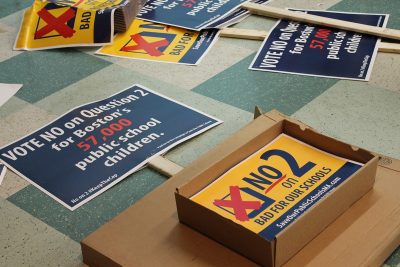
Approximately 400 people rallied at the William E. Reed Auditorium in Dorchester Tuesday evening, to express opposition to Question 2, which will be voted on Nov. 8. This ballot question will decide if the cap on the number of charter schools in Massachusetts will be raised or not.
Rally speakers stressed the importance of understanding the campaign not as an anti-charter movement, but as a campaign that focuses on delivering equal educational opportunities to residents.
“Don’t raise the gap!” chanted City Councilor Tito Jackson, with the crowd repeating after him. “We need to work on closing the achievement gap!”
Jackson said that with a yes vote on Question 2, Boston students would be at a disadvantage and distanced from resources.
“If the majority were to vote yes, we would actually take even more needed resources away from the most vulnerable students in the City of Boston,” Jackson told The Daily Free Press after the rally. “Four thousand homeless students are served by the Boston Public Schools system. Thirty percent of the students are English language learners, and 20 percent of them are special education.”
Boston Mayor Martin Walsh, one of the speakers at the rally, expressed the importance of improving education in Boston as a whole, not solely public, private or charters schools.
“Every single school in our city has a positive story to tell; we can’t let people demonize our school, particularly those who never have, and never will, step foot in our schools,” Walsh said during the rally. “My conversation with the community isn’t about anti-charter schools. If we’re going to invest in education, let’s invest in the system we have today.”
After delivering his speech, Walsh spoke with the Free Press, and said he is not necessarily opposed to increasing the cap of the number of charter schools, but is against the way the question is phrased on the ballot.
“It’s potentially going to cause hundreds of millions of dollars for the City of Boston over time, so I think there are some concerns,” Walsh said. “We can’t go back and make corrections once we go through with the vote. In my opinion, the place to raise the cap is in the legislator.”
Massachusetts Rep. Katherine Clark, another speaker at the rally, said the ballot question is vital, as it would affect every student in Massachusetts, regardless of their background.
“I strongly believe this is a very important ballot question because I really think this is about equal opportunities for every student no matter what their income or background,” Clark, a Democrat from Melrose, said after the rally. “We’re not going to do that by pitting charter schools against public schools.”
Juan Cofield, the chair of the New England Area Council of the NAACP, which helped organize the rally, said the opposition against Question 2 developed as a grassroots campaign.
“What we understood, and knew from the beginning, was that this was to be a grassroots campaign with lots of folk from the community — parents, teachers, taxpayers, civil rights organizations — and that’s what it has been,” Cofield said. “We are confident, with the momentum of this movement, that we are going to win.”
Attendees at the rally said they are voting against Question 2 because it would bring financial drawbacks to public schools.
Keisha Lewis, 41, of Dorchester, said the loss of funding for cultural and art-based classes caused by initiatives like Question 2 is detrimental to education.
“We’re losing funding for programs,” she said. “We’re losing funding for language classes, music classes, art classes, and those things are really important to have, to build well-rounded students.”
John Lerner, 58, Roxbury, said events like the rally are rare yet important for the cause, as it brings individuals from all different backgrounds together.
“It’s important for us to occasionally come together,” he said. “Everyone in this group is on some level an activist. We never, ever have an event like this, so it’s kind of interesting for it to happen.”
Marlena Rose, 55, of Roxbury said it is important to maintain the cap on charter schools, largely because of the number of students impacted by the vote.
“I came to the event tonight because it’s important for our community to know that we need to keep the cap on charter schools because it doesn’t serve all of the students,” Rose said. “It’s a very small population of charter school students, 8,200, compared to the 57,000 in public schools who would be affected negatively if we kept the cap on charter schools.”
















































































































